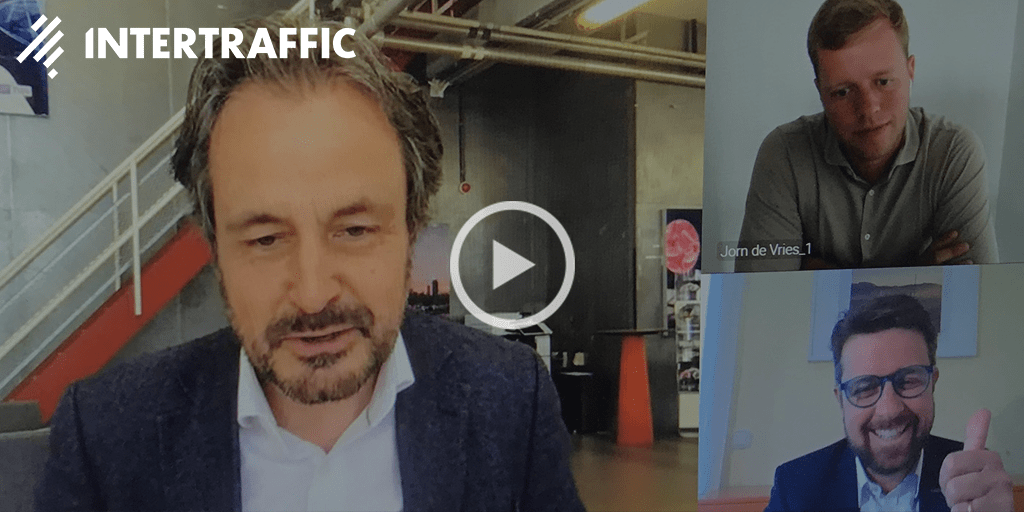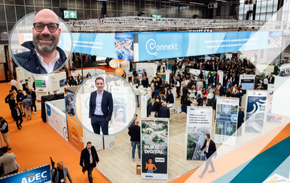Loading component...
Intertraffic webinar: smart measures to avoid post-Corona traffic congestions

Traffic management in the new normal
Intertraffic held the second of its webinar series this week with the event focusing on a subject that has become increasingly important and prevalent as lockdown restrictions are slowly lifted across the world. Smart Measures to Avoid Post-Corona Traffic Congestion - with local and national governments imploring us to not travel by public transport for the time being we're being encouraged to use our cars as much as possible after two decades of being told the exact opposite, but how are our cities going to cope with what could easily be described as in influx of additional road traffic?
Guest speakers Max Eichhorn, Vice President, Mobility Operating System and Advanced Traffic Management Software Solutions at Siemens Mobility in Germany, and Flitsmeister's founder and managing director Jorn de Vries, offered glimpses into how their respective companies were looking to address the potential problems. What will the impact of COVID-19 be on traffic flows? What will change in terms of traffic management? How will cities and traffic technology exponents respond to the changing traffic situations and the new demands on mobility? What kind of smart solutions do you have in store that can get us through this next phase of what will hopefully be post-Corona world?
'Cities have lost control over the mobility and transportation systems due to the emergence of new mobility players in the market.' (Max Eichhorn, Siemens Mobility)
Max Eichhorn, Siemens Mobility Germany
Before Siemens started the presentation the audience answered the following poll question: In Corona times cities are temporarily changing their mobility infrastucture to cater for more cyclists and shared services. What is your opinion about these measures? 48% of the people answered: Great, this should be permanent. 19% thought it to be great, but only temporary.
Siemens' Max Eichhorn elaborated on a new holistic approach to traffic management, presenting the Siemens Mobility Operating System that supports cities to manage their complete mobility ecosystem. 'The mobility ecosystem has changed significantly within the last years and cities have lost control over the mobility and transportation systems due to the emergence of new mobility players in the market. There are currently no tools that support cities to actively manage the demand of the infrastructure, changing travel behaviour and the throughput in a way that strategic KPIs like air quality, traffic flow or safety achieved,' said Eichhorn.
'Cities do not know if the already defined rules are being respected. Based on our global experience of traffic and transportation, Siemens Mobility has developed a new, state-of-the-art software platform, the Mobility Operating System, which provides a holistic overview and enables cities and authorities to set the frame conditions how the public authority and also private companies can offer, in a coordinated manner, mobility services and applications.' The new system allows cities to regain control over six vital factors: mobility transparency, fast response to irregularities and incidents, employ higher levels of automation in traffic and mobility management, set rules and gain control over all mobility providers, influence individual travel and freight decisions to maximise network capacity and finally to minimize human and environmental harm.
Watch recording via MyIntertraffic account
Key to the overarching and independent Mobility Operating System, explained Eichhorn, is that it ensures governance, monitoring, management and collaboration - all highly effective assets in a time of unprecedented crisis. Among the numerous benefits of this flexible solution is that there are a seemingly endless number of potential use cases, ranging from emission reduction, the management of new mobility services and in cases of unplanned events, such as traffic accidents and train derailment.
Jorn de Vries, Flitsmeister
Let's first find out the audience opinion on speed detectors. The audience answered poll question number 2: A speed detector is a usefull tool to inform drivers and improve road safety. 48% agreed on this and 15% did not agree. A positive answer for the next presenter to start the presentation with. Flitsmeister's founder and managing director, Jorn de Vries, focused on the company's "community approach" to minimise congestion using floating car date and how it can provide real-time traffic information and other smart mobility services to help relieve the congested road network.
'App users help to improve travel information by providing us with new information' (Jorn de Vries, Flitsmeister)
The Flitsmeister app launched 2009 and now has 1.7 million users in the Benelux region, helping road users to travel safely and efficiently by offering additional customized mobility services. Says de Vries: 'The app not only alerts drivers of approaching speed cameras but also provides real-time traffic information and helps users to navigate to their destination. App users help to improve travel information by providing us with new information on speed cameras, accidents or traffic jams on their routes.'
De Vries stressed the importance of providing real-time traffic information, informing travelers about the best travel times to relieve pressure on the road network and other mobility services to be deployed in the era in the post-Corona world. In terms of the traffic situation after lockdown restrictions are lifted, the jury, as they say is out. Private car journeys will undoubtedly increase as travellers eschew public transport, but will this be balanced out by the numbers of people who decide that working from home is actually preferable and they are in fact more efficient? Flitsmeister's aforementioned community approach can make a significant contribution to how transport and our demands for mobility adapt.
The Flitsmeister app helps drivers to avoid speed traps, speeding tickets, congestion and accidents and can also warn drivers of approaching emergency service vehicles. In the current climate it's imperative for drivers to be fully informed without being overwhelmed with information, something that de Vries is well aware of. Flitsmeister's 1.7m users make an average of 40m trips a month, creating 5billion GPS points, including 20m incident reports in 2019, the system being described by several attendees as being 'more accurate and reliable than Waze.'
With all this valuable data at their disposal, attendees were keen to find out if de Vries had ambitions to deviate away from solely focussing on road traffic and what his feelings were on the use of probe vehicle data for improving traffic safety. Time restrictions prevented all of the questions being addressed but moderator Carlo de Weijer was on hand to ensure the presenters receive the questions that there was no time to answer.
NEXT WEBINAR: 23 JUNE
In April Intertraffic kicked off a series of monthly webinars, with the next one scheduled for 23 June 2020. More information about future webinars and the recording of this webinar can be found here. Would you like to be involved in next webinars? Contact us at marketing-intertraffic@rai.nl.




